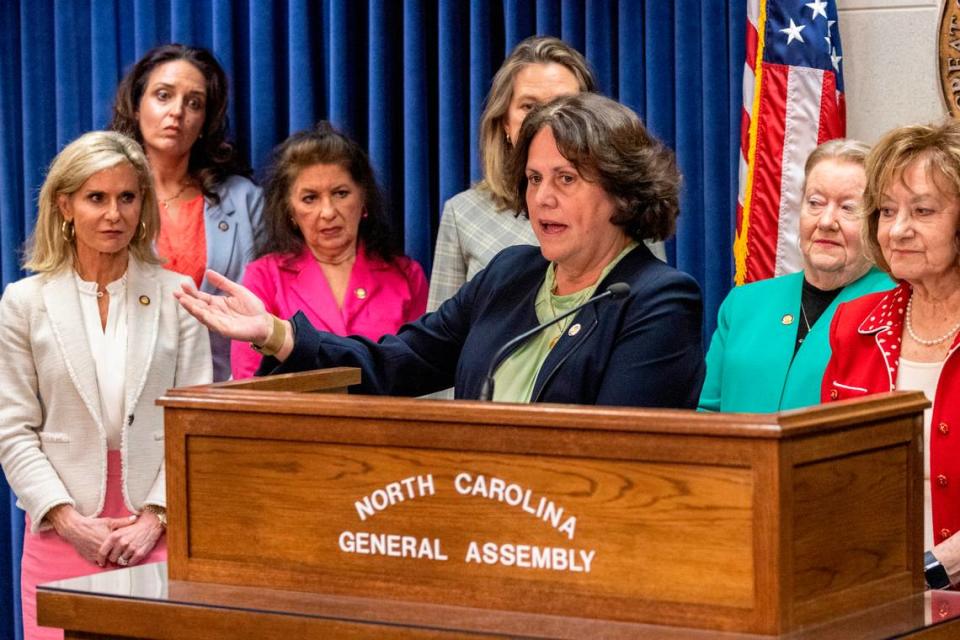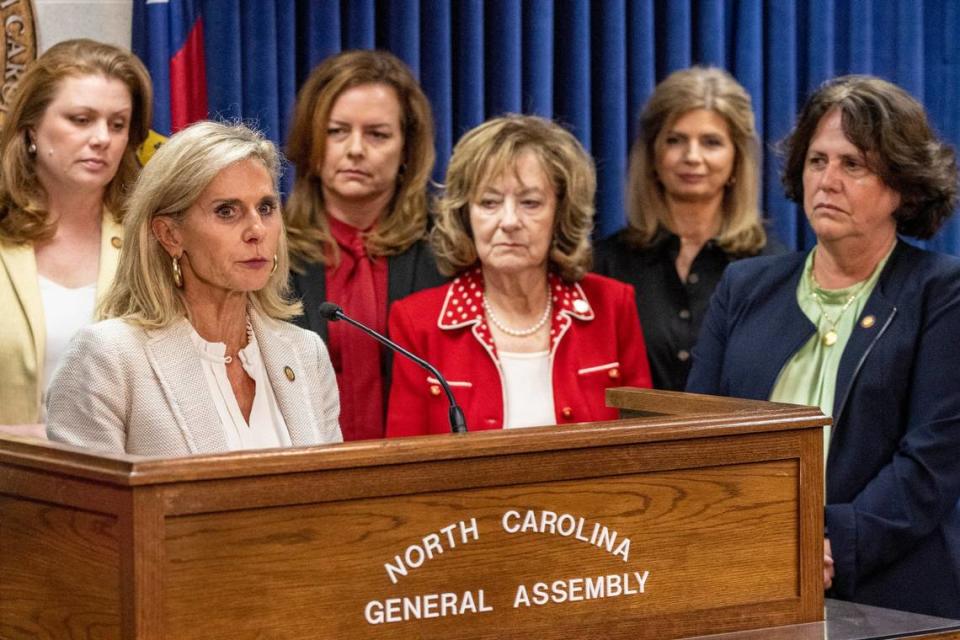Consensus in the caucus: How NC Republicans came to a ‘mainstream’ abortion compromise
- Oops!Something went wrong.Please try again later.
For months, a working group of Republicans from the North Carolina House and Senate met to hash out what abortion restrictions a bill would include — everything from a total ban to no change to the law at all.
The range of discussion was “all over,” Sen. Vickie Sawyer, an Iredell County Republican and key member of the abortion bill working group, said about the process Democrats have criticized for excluding their voices.
Sawyer said keeping the Republican working group’s conversations confidential resulted in a more encompassing bill with policy and funding, beyond restrictions, that “helps moms say yes.”
With a supermajority in the General Assembly, Republicans have enough lawmakers to overturn a veto from Democratic Gov. Roy Cooper on their own, but only if they get every member to agree. With a range of positions on changing North Carolina’s abortion law that has stood at 20 weeks, it meant months of internal debate leading up to the deal announced this week.
Negotiating the exceptions
Beyond settling on a general abortion ban after the first trimester, which ends after the 12th week of gestational age, Republicans had to debate how many weeks they would allow for exceptions and what the criteria would be for granting those exceptions.
Abortions in cases of rape or incest are permitted in the bill for up to 20 weeks of gestation, and there is no burden of proof requiring evidence like a criminal charge or a report to police. It will be noted by the physician conducting the abortion procedure on documentation that is sent to the N.C. Department of Health and Human Services.
Like every other provision, Republicans debated that as well.
“I can speak from my perspective. I was very adamant about not having a reporting requirement because I did not want a young woman who was raped to have to go through anything else,” Sawyer told The News & Observer in an interview Wednesday. “So for me, that was a big deal.”
Within the overall working group was one group of Republicans from the House and a second, smaller one from the Senate. All four women Republican senators — Sawyer, Sen. Joyce Krawiec of Forsyth County, Sen. Lisa Stone Barnes of Spring Hope and Sen. Amy Scott Galey of Alamance County — were part of the working group.
Eleven key Republicans from the group — Sawyer, Krawiec, Galey, Barnes, Sen. Jim Burgin of Angier, Sen. Michael Lee of New Hanover County, Sen. Kevin Corbin of Macon County, Rep. Sarah Stevens of Mount Airy, Rep. Erin Paré of Holly Springs, Rep. Dean Arp of Monroe and Rep. Kristin Baker of Concord — became the conferees for Senate Bill 20, the people listed as having decided on the final version of the bill.
Senate leader Phil Berger, an Eden Republican, came into the process as they came closer to consensus. House Speaker Tim Moore said Wednesday night that he and Berger didn’t need to get involved in some of the big decisions as they do for other debates over major legislation like the budget. Moore said that each chamber’s part of the working group met separately, then together, then separately again as negotiations progressed.
Galey told The N&O on Wednesday that “the Republican Party is a big party. We don’t all eat the same breakfast cereal and chant the same chants every morning. We bring our own experiences and our perspectives to all the work that we do.”
“And the same was true with that working group. So we talked about our lives, our families, our friends, and shared experiences. We were very honest with one another about what our lives have been like, and that is why it should be confidential,” Galey said about the meetings.
Consensus around 12 weeks, after months of debate
Negotiations in the Senate centered on getting to the 30 Republican votes needed for a supermajority, as Republicans have no room not to be unanimous. The House, too, has exactly a supermajority with 72 Republicans, after Mecklenburg County Rep. Tricia Cotham switched from Democrat to Republican last month. Cotham voted for the bill Wednesday.
Berger shared his own expectations of what the bill might include soon after Republicans gained a supermajority in the Senate as a result of the 2022 elections. In November, and earlier in 2022, Berger talked about changing the law to restrict abortions after the first trimester, which ends after 12 weeks. He said then that it will depend on “where the caucus is.”
On Wednesday, Berger told reporters on the Senate floor that “there was a broad range of opinions within the caucus,” including some who “if they had their preferences, would want to prohibit abortions, period. Some were in favor of a heartbeat bill. We had actually had some that felt that the current 20 weeks was where we should be. And some were 12 weeks,” Berger said.
“What we were trying to do is pass legislation that would be enacted into law that would move the needle in what we would consider to be a positive direction on the question of life and protecting the unborn,” he said.
“It was my thought a year ago that we were likely to be able to get consensus around 12 weeks, which is what turned out to be the case,” Berger said.
He said that the working group debating since January is “an indication of the fact that getting to this point was not something that was preordained. But it is something that that I think accomplishes what I was hoping that we would be able to accomplish — and that is moving the needle in a positive direction.”
Berger said Republicans were working on the details of the bill up until the last couple of days.
Sawyer said meetings were held in various places at the legislative complex, and they tried to meet in person as much as they could.
“You could be as involved or not involved as you wanted to be,” Sawyer said of Republicans in the working group.
“It was definitely like: fight and come back, fight and come back. And sometimes the fights lasted a week, and sometimes the fights lasted two days. And then we’d have to come back. It was like a family fighting,” she said.
Asked about Sawyer’s support for not having a burden of proof for the rape and incest exceptions, Galey said she agreed with Sawyer. But as for other aspects for the bill that were important to her, Galey said she wanted to keep that confidential.
Sawyer said that not making the working group’s discussions public made its members more comfortable and freer to have discussions.

Stevens said the House’s part of the working group started with about 20 or 30 people before being narrowed down. She said they had “lots and lots and lots and lots of discussion” about deciding the restrictions.
“We did have people who wanted to have a reporting requirement for rape and incest. Some people wanted it to be prosecuted. Some people didn’t want to put it in at all. Some people had varying opinions,” Stevens told reporters on Tuesday. “We talked about it being between a mother and the doctor, but we have doctors that are willing to abort a baby at nine months, when that in fact is already a child. So that’s one reason we dealt with this — as the state, we needed to come to some regulation,” she said.
A ‘mainstream’ bill
At a committee meeting Wednesday morning, Republicans repeatedly called the bill “mainstream,” citing polling and comparing it to other abortion restrictions globally.
Moore, the speaker, had asked House GOP members not to file a bill while the working group was negotiating, but Rep. Keith Kidwell, a Chocowinity Republican and member of the ultraconservative Freedom Caucus, filed a bill that would have created a total ban on abortion with the only exception being for the life of the mother. That bill went nowhere.
While discussions included total abortion bans, some lawmakers thought the result would not be that extreme even before the conversations began.
In December, Sen. Jim Perry, a Kinston Republican, told The N&O that “I think if we look at polling data, and based on conversations I’ve had with members, there’s a lot of different opinions. But it’d be difficult for me to see anything extreme passing the General Assembly,” Perry said.
Some Democrats disagree, like Democratic Gov. Roy Cooper, who called the bill “an extreme ban” and said he will veto it.

The House passed the bill along party lines, 71-46, on Wednesday night, with the Senate expected to vote on the bill during a 10 a.m. session on Thursday. Then it goes to Cooper. Once Cooper vetoes it, the bill would come back to the General Assembly for an override vote.
After the vote, Rep. Julie von Haefen, an Apex Democrat who lodged a constitutional protest during the floor debate, said that when Republicans “say this is a compromise bill, it was a compromise among Republicans. It was not a compromise with us.”
If all Republicans in both chambers vote to override Cooper’s veto — and they have the three-fifths majorities necessary to do so if everyone is there for the votes — then the bill will become law. Republicans also courted the votes of some House Democrats, but none voted with them on the bill Wednesday, and no Senate Democrats were expected to vote with Republicans on the final vote Thursday.
